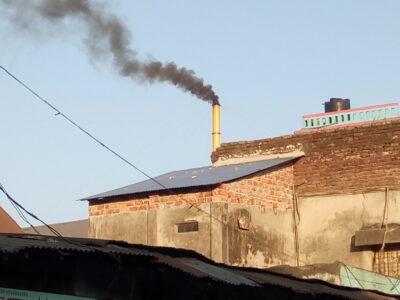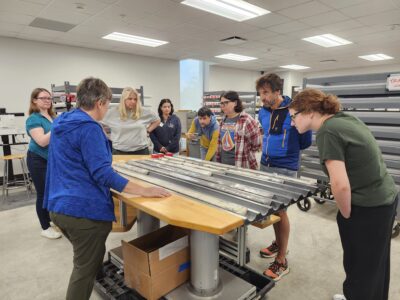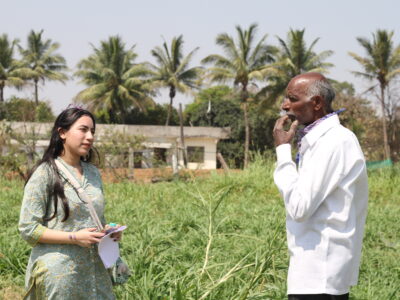
Neerada Poduval was seeking an immersive, fast paced graduate program that would offer students practical skills for addressing today’s global environmental challenges. As a professional with five years of experience in the environmental field, Neerada began the program in May 2016 to bolster the foundation she built and further develop her understanding of public policy formulation and implementation. For her, bringing sustainability to Southeast Asia has been a lifelong dream.
She began her sustainability journey at the age of 15, when she moved from India to Singapore on a full scholarship. She majored in Environmental Engineering at Nanyang Technological University, a regional hub for water technology research.
After graduation, Neerada worked for the Singapore Environment Council, a primary local NGO, where she addressed a range of environmental issues, until securing a prestigious position with the Government of Singapore. As a program consultant at a UN Environment Programme collaborating center on UN Framework Convention on Climate Change projects for Southeast Asian governments, her work brought her from Denmark to Taiwan, as she participated in conferences and trainings around the globe.
Anushree Kedia, and intern with the MPA in Environmental Science and Policy program, spoke to Neerada about her experiences working for the Government of Singapore and where she hopes this program will take her.
What inspired you to want to become a sustainability professional?
As long as I can remember, I wanted to make a difference in the world around me, utilizing and developing my skills as best as I could. After my undergrad, I was initially involved in environmental permitting and compliance, but wanted to move beyond that to help influence people, policies and the future.
At the Singapore Environment Council, I got my first real taste of sustainability consulting, working on standards development for ecolabels and awards. It is a very exciting and fulfilling field to be part of, because you’re simultaneously performing a variety of roles. These roles included project management, technical advisory, stakeholder engagement and communication. I led efforts in accreditation projects and partnered with industries to enhance corporate sustainability reporting efforts in the private sector.

Working next in government, the Building and Construction Authority of Singapore exposed me to challenges and opportunities within the building sector at a national and international level. For the United Nations Framework Convention on Climate Change project, I enjoyed being part of a project team of international experts.
I am keenly aware of the issues faced on the ground and the importance of political will and buy-in from the private sector to effectively develop and implement policies. I have had the opportunity to work on sustainability issues at the design stage, especially in developing economies, and I know from personal experience that there is immense potential to effect positive change in this field. My entire career has been focused around sustainability. It has been a natural path for me, and one that I wish to continue on.
What drew you to the Environmental Science and Policy program?
I was already working on policy development. Over the past five or so years, I’ve worked in the private, non-profit and public sectors in Southeast Asia. While I learned a lot on the job, I felt that an advanced degree would equip me with the management and finance skills to better influence and inform strategies. My long-term professional goal is to help make the triple bottom line the norm rather than the exception. The MPA-ESP program was perfect for me at this stage in my career because it’s fast paced, and has a unique combination of science, policy, technology and management—all the skills and info needed to effectively demonstrate and implement the business case for sustainability. Another key factor was that many of the faculty members are adjunct real-time practitioners; I appreciate the value of what they teach, as the wisdom they bring makes the course material more relevant and very special.

What are your favorite classes?
From the summer semester, I loved climatology – the science itself is fascinating, and it was very well taught. As a sustainability professional, it is extremely important to be able to articulate yourself clearly and effectively when interacting with the public. This semester, my sustainable finance elective is the most challenging and yet my favorite—it is so important to understand and be able to speak the language of finance, regardless of the type of role you are in. It gives you that extra credibility and edge, and exposes you to a whole new way of thinking.
Any memorable experiences as a student in the program?
Ninety-nine percent of my experiences at Columbia have been memorable! I consider myself lucky to be able to call such an incredible cohort my friends—if I had to pick one experience, it would be the Workshop in Applied Earth Systems Management – we work in teams through the semester to scientifically assess and implement environmental policies. As deputy manager in the summer, it was exciting to be part of each teammate’s journey as they became well-versed in their topic and to see them blossom by the end of the term. My classmates here continue to amaze me with their intelligence, eloquence, creativity and kindness. I truly feel I have “come home” to my people, my cohort.
Are you enjoying studying here in NYC?
I am truly enjoying my time in NYC—it is as if I have my finger on the global pulse. Professionally, the type of events, the cadre of speakers you are exposed to is truly extraordinary. Whether it is Ban Ki Moon, the UN secretary-general, or Brian Deese, senior advisor to President Obama, it is a privilege to be able to listen to distinguished members of our society. Besides, I’ve always dreamed of living here—going for a run in Central Park or on the Hudson Greenway, going to the Met to gaze at works by my favorite Impressionists, biking through the city with my friends, catching a Broadway show—it’s surreal.
What would you like to do after graduation?
This semester, I am interning part-time at the Center on Global Energy Policy, working on a white paper on the water-energy nexus. It is quite surreal to be working in the same office as Jason Bordoff and other energy industry veterans, and this has given me deep insight into the type of career I want. There are two areas that are of particular interest to me, renewable energy and corporate sustainability.

Having worked in the nonprofit and public sectors, I understand the potential of the private sector to significantly impact climate change and other sustainability issues. But in general, I’ve noticed that the private sector tends to be underutilized. Therefore, I’d like to apply my background and skills at a multinational corporations to utilize some of this untapped potential, through sustainability strategies and public-private partnerships.
For more information about the MPA ESP program, visit: http://mpaenvironment.ei.columbia.edu/




I am surprised a qualified environmental engineer more interested in ESP as if it is some thing new but her story and experience indicate she should know about public policy and what are the pressing environmental problems like dengue fever,haze from Indonesia,mosquito breeding at construction sites and so on where an engineer can play a crucial role.As a pioneer in Sustainable Water Development in 1977,I have met the Head of Asian Regional Director for UN FAO and Asian Executive Director for UNEP in their offices as well as Executive Director for UNDP and UNEP in 2001 and 2002, and attended World Summit on SD in 2002.I have no doubt with her exposure to ESP at Columbia U Earth Institute she has a great opportunity to be a truly global expert in the years to come.My best wishes to her future.